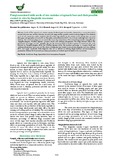Fungi associated with seeds of two varieties of spinach beet and their possible control in vitro by fungicide treatment

View/
Date
2015Author
Khare, K.B.
Moeng, K.O.
Publisher
Int.J.Bioassays, http://www.ijbio.comType
Published ArticleMetadata
Show full item recordAbstract
Seeds of Two spinach beet varieties namely; Fordhook giant and Lucullus obtained from commercial markets around Gaborone were used for detection of seed-borne fungi and their possible control in vitro by fungicide. Four hundred seeds of each variety were surface sterilized with 5% sodium hypochlorite for five minutes before placing them on moist filter paper and agar plates (10 seeds/90 cm Petri plate), and incubated at 24±2º C for 12 hours under light and 12 hours in darkness. Five seed borne fungi were recovered after seven days of incubation. The isolated fungi included Aspergillus niger, Aspergillus fumigatus, Penicillium digitatum, Cercospora beticola, and Arthrinum phaeospermum. The fungi detected reduced the germination percentage of seeds. Aspergillus niger was the dominant (95% in Fordhook giant) recovered from the seeds followed by Aspergillus fumigatus (49%) and Penicillium digitatum (14%). The incidence percentage of Cercospora beticola and Arthrinum phaeospermum. were very low. The effects of fungicides were studied in vitro and the fungicides used were Dithane M-45, and copper oxychloride. Both fungicides were not so effective in reducing fungal incidence and increasing seed germination. Dithane M-45 increased percentage germination in Fordhook giant but failed to do so in Luculus.
